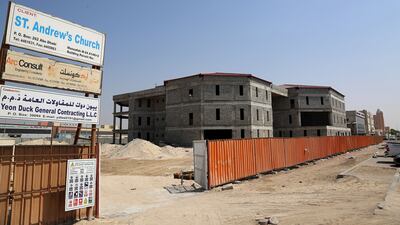From a distance it might be the site of another new luxury hotel; a huge raw concrete shell with rooftops already clad in red tiles that echo a Mediterranean villa.
Except that luxury hotels are not generally found on a litter-strewn corner of the Mussaffah industrial area, surrounded by a constant flow of heavy lorries and battered pickup trucks,
The building’s true purpose becomes clear once inside the unfinished interior, as the sounds of praise to God echo down from the top-most floor.
This is All Saints Church, which, on Saturday, marked the halfway point to its completion as the largest Anglican place of worship in the region with a service of thanksgiving.
Eight of the faiths who will use the building gathered for a service that included the dedication of the new church, along with prayers, Bible readings and song.
The service was led by the Rev Andy Thompson, chaplain at St Andrew's Church, currently one of main centres of worship in Abu Dhabi, but over 22 kilometres and a slow bus ride or an expensive taxi trip away for the expanding Christian community in Mussaffah.
“It’s been a long and difficult journey,” said Mr Thompson, “so we grasp every opportunity for celebration.”
Money is the problem. The church needs another Dh15 million to make its completion date next March but will currently exhaust current funds by the end of October, when, as Mr Thompson says, “work will grind to a halt".
“We need a miracle,” he adds.
All the money has been raised by local congregations, especially the Korean Methodist Church, but the Christians of Mussaffah are not wealthy, and while they give what they can, it is not enough.
One issue is that local banks have declined to lend for construction costs, deterred by a project that involves religion, and implications of what might happen with a default. “No bank wants to see a headline that reads ‘local vicar sent to prison for unpaid debt’,” as Mr Thompson puts it.
All those involved still have faith that the church will be completed. There is no doubt there is a huge need in the area. The top floor is divided into five areas for worship, the largest capable of holding 1,000 people.

All five rooms are already completely booked in two-hour slots for the prime day of worship on Fridays. In total, All Saints can hold 3,000 worshippers at any one time, meaning over 12 hours it could, in theory, accommodate 36,000 people.
About half a million Christians are believed to live in the city of Abu Dhabi, many of them from India, Nepal and the Philippines. In Mussaffah they represent the low-income workforce that constructs much of the city’s new projects and runs its basic services.
St Andrew’s Anglican Church has long offered a home to other branches of the faith, but cannot cope with the growing numbers. Mr Thompson says that, at a conservative estimate, there are 200 different churches and doctrinal divisions in Abu Dhabi, all wanting to hold their own service.
Many of these are effectively homeless, meeting for prayer where and when they can, sometimes in hotel receptions, or even cinemas.
The New Testament Church, which serves a largely Indian and Sri Lankan community in Abu Dhabi, began with just 30 members in the late 1970s when it was first established, but now packs 500 into St Andrew’s.
“For our Friday service, it is just not big enough,” says church member Varghese Samuel. “And we have to bring people by bus.”
The first Anglican Christian service was held in Abu Dhabi in December 1957, conducted by a Bahrain-based British clergyman specifically flown in for the tiny expat community, which already included several nationalities.
Land for a church was given by Sheikh Zayed bin Sultan in 1966, as Ruler of Abu Dhabi, with the original St Andrew’s built near the Corniche until it moved to its present location in Al Mushrif in 1984.
In 2004, the President, Sheikh Khalifa, donated land in Mussaffah for another church, in what Mr Thompson calls: “An extraordinary gesture of generosity by a Muslim government.”
Construction was long delayed, and at one point the site was almost lost to commercial development, but the walls, roof, and interior floors and staircases are now complete, although much work remains before a projected opening day around Easter 2018.
The design, a series of octagons, owes much to Heejin Kang, pastor at the Korean Methodist Church of Abu Dhabi, although he insists: “I was inspired by the Holy Spirit.”
“God is the architect,” he says.


